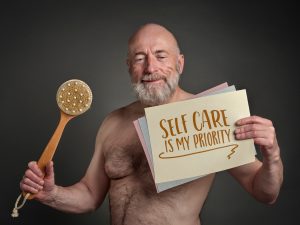Reading Time: 6 minutes
Self-care, self-love, self, is the spoken word. Everyone’s been talking about this lately, and for good reason.
We all know that ‘Life’ doesn’t always happen as planned, and as we experience life, we also learn that acceptance of what comes your way, does indeed help you heal faster from the brickbats.
As said, bumps on the road every now and then, a few challenges that might seem a bit difficult to handle and take a toll on you emotionally are a necessary ingredient to show you are alive, as even a straight line on an ECG, does indicate death, a reflection that ups and downs are necessary to keep us alive and ticking.
When you feel physically and emotionally at your best, it’s easier to deal with life in a healthy and productive way. It’s the daily self care habits that you inculcate into your routine that will tide you through the challenging times.
That’s when self care enters the chat. Mind and body wellness is so important!
What is self care and why is it so important for your health?
Let’s clear up one common misconception, Self care is not to be mistaken with self indulgence or being selfish.
Self care is looking after your physical and emotional well-being, enabling you to maintain good health, fulfill your responsibilities, support others and achieve your daily, weekly, monthly and yearly goals. It is all the steps you take to manage life’s stressors and prioritise your overall personal health.
Self care isn’t a one-size-fits-all concept; what works for one person may not work for another. It’s a highly individualised approach, recognising that people have unique needs.
In our fast-paced, technology-driven world, self care is crucial for coping with everyday stresses, including work-related pressures and the relentless pace of modern life. Many people feel increasingly isolated and struggle to relax, which can lead to heightened anxiety and a sense of overwhelm. Identifying and addressing unmet personal needs is a fundamental aspect of self care. It involves taking deliberate steps to focus on both your physical and emotional well being, tailored to your specific requirements.
Building a personalised self care routine will require some effort, but the investment pays off in the long run. It’s a vital strategy to maintain overall health and well being and recognising that self care is as unique as the individuals who practise it.
A few things you should keep in mind coming up with a self care plan-
- Do I see myself using this approach? Your self care plan has to be doable and beneficial.
- Are you financially able to support your self care goals?
- Don’t burn yourself out by overdoing self care- It should be relaxing, not stressful.
- Make sure you practise self care regularly be consistent.
- Take a look at your past- what relaxing self care activities have previously worked for you.
Types of self care-
- Emotional self care– taking care of your emotional needs and well being.
- Physical self care– taking care of your physical health.
- Spiritual self care– not everyone practises spiritual self care but if you are a spiritual person, connecting with a higher power can bring you calmness and joy.

Start by taking stock of your physical needs-
Physical self care encompasses everything that keeps your body functioning at its best. When addressing physical self care, take time to pinpoint your specific needs and take stock of what measures you need to employ to fulfill them. If you identify your areas that need improvement, focus on those aspects in your self care strategy.
Sleep-
Typically, adults require approximately 7 to 9 hours of sleep per night. Consistently falling short of getting enough sleep can have adverse effects on your mood, ability to focus and overall well being. It’s quite common to not meet your recommended sleep quota due to unexpected circumstances but making an active effort to get enough sleep can tremendously help your physical well being.
 Healthcare-
Healthcare-
Effective self care means overcoming the reluctance to visit a doctor and address any health concerns. If you feel generally well, it often raises the question of- do I really need an annual check up? However, routine visits to a healthcare provider are essential for detecting and addressing health issues early on and preventing them from becoming severe. Neglected health problems can worsen over time and impact your well being. Taking care of you from the inside out is one of the highest forms of self care.
Nutrition-
Good nutrition extends beyond food choices; it also involves mindful eating habits. While a balanced diet is crucial for your overall health, the way you eat matters too. Rushing through your meals, eating while you’re distracted, or waiting until extreme hunger strikes can undermine your well being. Mindful eating and intuitive eating are two approaches that promote satisfaction with food and allow you to enjoy a variety of foods in moderation without unnecessary restrictions or stress.
Exercise-
Experts advise 150 minutes of weekly exercise for capable adults, emphasising the importance of enjoyable activities to enhance adherence and self care. Tailoring your exercise choices to your preferences and opting for enjoyable alternatives can make your fitness routines more appealing.
Physical intimacy-
Intimacy is commonly equated with sex, but other forms of physical contact are crucial for you as well. Physical touch is a fundamental human need to feel connected with other humans. Consider activities like massages, hugging your loved ones, finding a cuddle partner, sex, playing with a pet, holding someone’s hand or playing with animals.
Mental and emotional self care-
 Mental needs refer to your cognitive needs and maintaining your mental and emotional health. In other words, you should think about what invigorates your mind, maintains your cognitive sharpness and keeps you sane.
Mental needs refer to your cognitive needs and maintaining your mental and emotional health. In other words, you should think about what invigorates your mind, maintains your cognitive sharpness and keeps you sane.
Reducing stress-
 The level of stress you experience can substantially affect your mental health. To begin addressing this, start by examining the sources of your current stress. Evaluate how you’re coping with these stressors, figure out effective ways to eliminate them and what best you can add to your life to limit the effect these stressors have on your life.
The level of stress you experience can substantially affect your mental health. To begin addressing this, start by examining the sources of your current stress. Evaluate how you’re coping with these stressors, figure out effective ways to eliminate them and what best you can add to your life to limit the effect these stressors have on your life.
Personal growth and boundaries-
Establishing firm boundaries is essential to manage your stress and carve out time to take care of yourself. These boundaries may involve declining unwanted commitments, refraining from volunteering for extra tasks and openly communicating you need time to do what you want. Self care also encompasses your personal growth, which contributes to a more genuine and fulfilling life by fortifying your self-identity and enriching your existing relationships.
Understanding your unique needs is pivotal to self care.
Taking care of your emotional needs-

Emotional self care involves recognizing that your emotions can signal unmet needs in your life. It’s about understanding your feelings, seeking counselling when necessary to enhance your emotional and physical well being, and preventing burnout by addressing challenges and stressors.
Taking breaks-
Taking breaks to relax and recharge your brain is important to function properly, especially if your mind tends to wander frequently. Consider technology breaks and activities like doodling, nature walks, or brief naps for mental rest.
Mindful awareness-
Understanding your emotions is challenging when their meaning is unclear. Dedicate time to embrace your feelings, facilitating the recognition of your unmet emotional needs. Meditation, journaling and confiding in trusted individuals can help with your self care journey.
Companionship and affection-
Each person’s social needs vary based on your personality and circumstances. Fulfilling these needs can involve spending time with friends, making new connections and considering the type of interaction that aligns with your emotional state. Affection and emotional support are essential.
Alone time and self reflection-
 Taking time off to relax, whether it’s taking a day off work, creating personal space at home or being alone and indulging in a hobby, is crucial for emotional well being and should be incorporated into every self care regimen.
Taking time off to relax, whether it’s taking a day off work, creating personal space at home or being alone and indulging in a hobby, is crucial for emotional well being and should be incorporated into every self care regimen.
Putting it all together- How to establish a self care routine
- Beginning a self care routine doesn’t have to be overwhelming.
- Start by identifying activities that bring you joy and rejuvenate you. Make a list.
- Pinpoint a single behaviour you’d like to include in your routine for the week, gradually increasing its frequency.
- Monitor your well being and consider adding more practices over time.
- Seek support from loved ones, a coach, licensed professionals, or available resources like your healthcare plan or workplace.
- Simple self care activities like journaling, meditating, reflecting and showing gratitude, taking up a hobby or listening to music before bed to unwind can make a huge difference to your overall health.
- Self care varies from person to person. As you evaluate your personal needs, you’ll probably tweak your self care activities as well.
- Sometimes, self care is as simple as doing more of that which brings peace and joy to your soul.
- Just remember, at the end of the day, you know what’s best for you.



